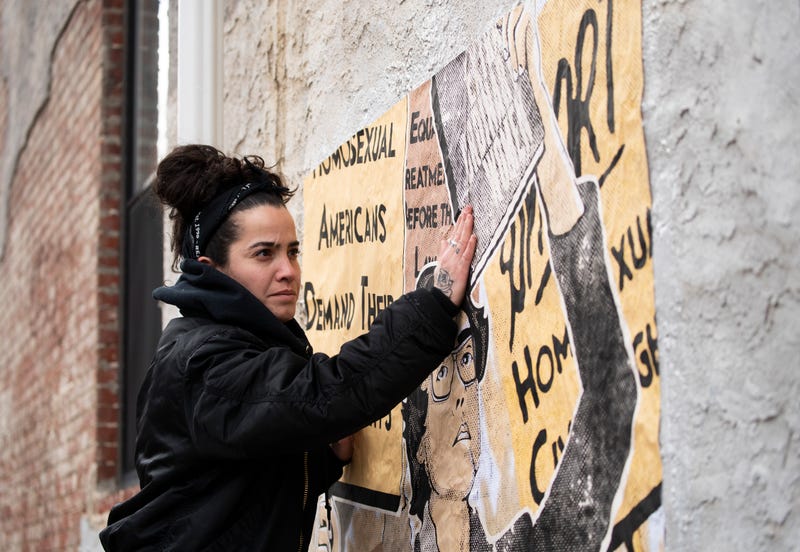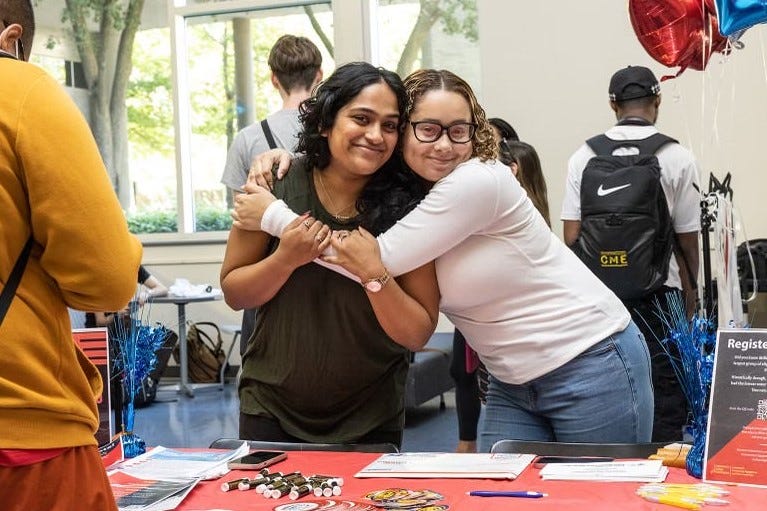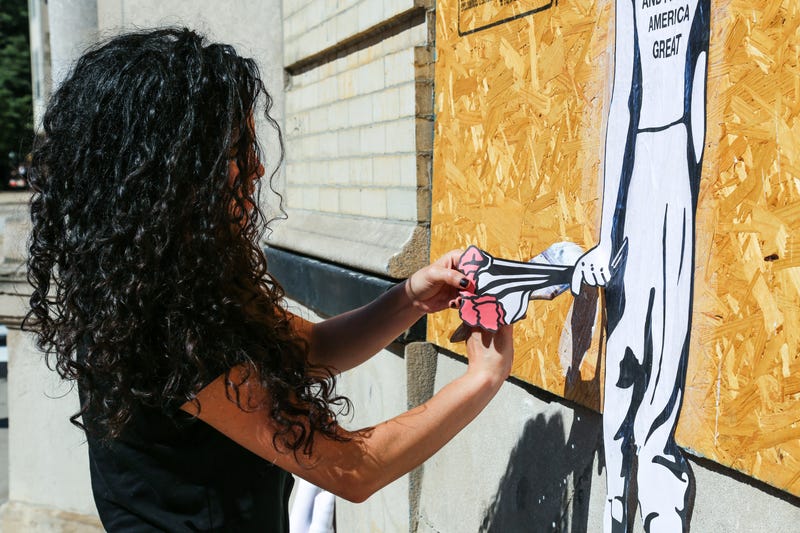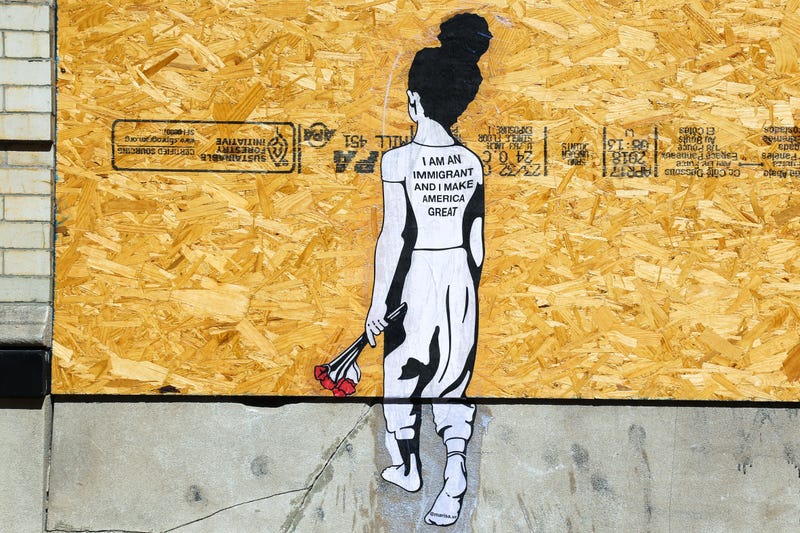
PHILADELPHIA (KYW Newsradio) — Marisa Velázquez-Rivas’ parents always prioritized voting. They never missed an election and always researched candidates.
While they grew up in different countries — her mom from Venezuela, and her dad from Puerto Rico — they always made it a point to show out for their community, something that continued when they got to the mainland United States.
Velázquez-Rivas, 34, feels lucky to have had that example, especially given that many Latinos feel disconnected from the electoral process in the U.S.
“It’s so heartbreaking to see politicians ignore communities that have been so involved in their own country’s politics,” said Velázquez-Rivas, a freelance digital artist and social justice advocate.
Advocates for Latino voters say politicians often ignore their community until right before the election, which leaves many frustrated and unmotivated to vote. Other barriers including a lack of bilingual interpreters at the polls and Spanish-language voting information, and misinformation about the political process, may also influence overall Latino participation in elections.
Mijente, a nationwide Latinx grassroots organization, is trying to bridge these barriers by launching several campaigns and voter registration events throughout Philadelphia.
Erika Almirón, Mijente’s senior organizer for Philadelphia, is hosting a Philly Vota Seguro canvassing event this weekend to try and reach 40,000 North Philly residents, making it potentially the largest bilingual canvas Philadelphia has ever seen, she said.
If residents aren’t home or don’t answer, canvassers will leave QR codes on their doors to help them confirm their local polling place, Almirón explained.
“This isn't about getting people out to vote for a candidate specifically. This is about asking people why they're not coming out to vote, and what are their issues … so we can get a sense of what is happening in Philadelphia,” she added.
Nationwide, Latinos are most concerned about the economy, gun safety and abortion rights, much like most voters according to Equis Research, a set of organizations attempting to better understand the Latino electorate.
In Pennsylvania, Latino voters are most concerned about the economy, crime, and immigration, according to a NBC News and Telemundo poll.
While immigration is an issue that matters to Latino voters, some Democratic candidates believe they can talk about immigration and “feel like they’ve addressed Latino concerns,” said Michael Jones-Correa, a political science professor at the University of Pennsylvania.
But in Philadelphia, since 70% of the Latino population is Puerto Rican, while they may be sympathetic, immigration is not as high of a concern for them.
“Candidates have to be aware of the concerns of Latino voters, and particularly the concerns of the particular set of Latino voters in their districts,” Jones-Correa added.

While a majority of Latino voters have shown a preference for Democratic candidates in recent decades, the 2020 election showed a trend toward more GOP support, with some heavily Latino wards in Philadelphia showing a jump in votes for former President Donald Trump.
For Yeismarie Rivera-Olivo, who lives in Juniata, issues like health care and wealth disparity are driving her and some in her community to vote. For others, the lack of change in these issues is exactly why they aren’t voting.
“When you see them not voting, it's like you're wasting such a valuable opportunity to begin something greater,” said Rivera-Olivo, a sophomore at the Community College of Philadelphia.
Velázquez-Rivas hasn’t researched issues for this election yet, but always brings her phone in the booth to make sure that her vote aligns with her views, a move she urges others to do.
“You don't know these things,” she added. “You aren't educated on these things and I think a lot of people are scared to ask, especially Latinos, especially minority communities.”
Lack of bilingual interpreters and lack of knowledge
Amid the nationwide poll worker shortage, seven states including Pennsylvania have seen unusual threat levels against poll workers.
Philadelphia is trying to keep its workers safe by equipping them with cell phones, emergency contact numbers, and constant roving election office patrols to check in on polling locations.
While safety concerns may deter people from working the polls, most people don’t have time to help since Election Day isn’t a holiday, Jones-Correa said.
“Latinos are working sometimes one job, sometimes more than one job, and finding time to vote is hard and so finding the time to volunteer is even harder,” he said.
The number of registered poll workers this year has grown after a 70% increase in wages for judges of elections, inspectors, and bilingual interpreters, said City Commissioner Omar Sabir.
“We definitely want to try to get the pay to even be higher than that, because that's the cornerstone of democracy,” Sabir said. “Without our poll workers, we don't have democracy.”
Of the 8,500 poll workers needed for this election, Philadelphia has registered about 7,000 as of Nov. 2. Bilingual interpreters, with most of them being Spanish-speaking, make up around 200 of the registered workers, said Sabir, who declined to provide an ideal number.
Bilingual interpreters are mainly used to help translate voting information, like signs, and provide interpretation during the voting process, according to the City Commissioners’ website.
Ballots in Philadelphia are required to be translated into both Spanish and Chinese, a mandate that does not apply to the suburban collar counties.
Voters are also allowed to bring their own interpreters to the polls to help them translate election materials, but most don’t know that it’s an option, Velázquez-Rivas said.
“A lot of people don’t get educated on that either. There are many things that become hurdles to the Latino community in order to get their ballots in, so they just avoid it,” she added.
Almirón, Mijente’s senior advisor in Philly, thinks the city could do more to educate Latinos about how to find their polling place, where to find voting information, and how to vote by mail.


“In particular for Latinos who are newer to this country, or who were raised in another country, who have seen stolen elections, there’s a hesitancy to vote by mail because it’s like something of a learning curve,” she said.
Jones-Correa also believes many people, not just Latinos, who are concerned about the voting process could benefit from working the polls, because they could see how decentralized the voting process is.
“It’s just not an easy process to try and tamper with or to steal,” Jones-Correa said. “I wish more people would see sort of how democracy in action [works] because it would give them more faith in the system.”
Disinformation in Latino spaces affects voting
Many Latinos are apprehensive to vote because of misinformation being spread about elections and voter fraud, said Roberta Braga, the director of counter-misinformation strategies at Equis.
Most false narratives aren’t exclusive to Latinos; most start in English-language spaces and get translated into Spanish. But Spanish-language content stays up longer than the English-language equivalent, Braga said.
“There’s more that companies can be doing to invest in Spanish-language content moderators, to improve their systems to recognize Spanish-language disinformation, and to invest in more culturally-competent folks that are able to more readily identify the false and misleading stuff circulating in Spanish,” she added.
Last year, lawmakers urged the CEOs of Facebook, Twitter, and YouTube to help combat the spread of misinformation in these spaces, but a year later, not much has changed, the Guardian reported.
Misinformation in these spaces is also partly due to the lack of Spanish-language news. Univision and Telemundo are the two largest news sources for Latinos in the United States.
Often, many turn to the internet for their news, with 47% of Latinos going to YouTube, 38% going to Facebook, and 20% to WhatsApp, according to a 2022 report by Equis.
“Latinos engage with information and disinformation much like other communities of voters do,” Braga said. “We are not more susceptible or more vulnerable to this information. We're actually very skeptical.”
Ceiba, a Philadelphia-based nonprofit, partnered with the National Association of Latino Elected and Appointed Officials for their Defiende La Verdad virtual information sessions to recruit volunteers to help monitor and report disinformation in Latino communities.
“When people play with truth as a toy, and then use lies as a tool, that is very dangerous for democracy,” said Will Gonzalez, executive director of Ceiba.
In her personal life, Rivera-Olivo, the sophomore at CCP, has argued with family members about defending Donald Trump among other things. Her perception is that they are in a feedback loop with similarly-thinking friends.
“Because they speak Spanish, they can understand each other and talk to each other even if it’s dumb things like that,” Rivera-Olivo said.
Regardless of political affiliation, voting helps change the world we live in, she said.
“Especially when you grew up in a demographic that’s always put to the side,” she added, “you want to see these changes.”








